

Sophistication. Scope of sophistication[edit] In social terms, sophistication can be seen as "a form of snobbery".[3] A study of style conveys an idea of the range of possible elements though which one can demonstrate sophistication in elegance and fashion, covering the art of "[...] the shoemaker, the hairdresser, the cosmetologist, the cookbook writers, the chef, the diamond merchant, the couturieres, and the fashion queens, the inventors of the folding umbrella ... and of champagne.

Extreme. English[edit] Etymology[edit] From Old French extreme, from Latin extremus, the superlative of exterus Pronunciation[edit] IPA(key): /ɪkˈstɹiːm/

Sympathy. Sympathy (from the Greek words syn "together" and pathos "feeling" which means "fellow-feeling") is the perception, understanding, and reaction to the distress or need of another human being.[1] This empathic concern is driven by a switch in viewpoint, from a personal perspective to the perspective of another group or individual who is in need.
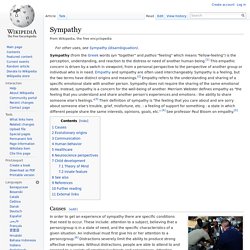
Empathy and sympathy are often used interchangeably. Sympathy is a feeling, but the two terms have distinct origins and meanings.[2] Empathy refers to the understanding and sharing of a specific emotional state with another person. Contrition. Exhortations to the value and necessity for repentance are quite common: "I desire not the death of the wicked, but that the wicked turn from His way and live" (Ezekiel: 33, 11); "...But unless you repent, you too will perish.
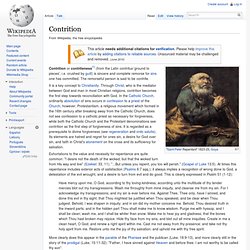
" (Gospel of Luke 13:5). At times this repentance includes exterior acts of satisfaction (Psalms 6:7 sqq.); it always implies a recognition of wrong done to God, a detestation of the evil wrought, and a desire to turn from evil and do good. This is clearly expressed in Psalm 51 (1-12): Have mercy upon me, O God, according to thy loving-kindness; according unto the multitude of thy tender mercies blot out my transgressions.
Wash me throughly from mine iniquity, and cleanse me from my sin. More clearly does this appear in the parable of the Pharisee and the publican (Luke, 18:9-13), and more clearly still in the story of the prodigal (Luke, 15:11-32): "Father, I have sinned against Heaven and before thee: I am not worthy to be called thy son". Homosexuality. The most common terms for homosexual people are lesbian for females and gay for males, though gay is also used to refer generally to both homosexual males and females.
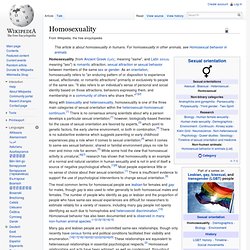
The number of people who identify as gay or lesbian and the proportion of people who have same-sex sexual experiences are difficult for researchers to estimate reliably for a variety of reasons, including many gay people not openly identifying as such due to homophobia and heterosexist discrimination.[10] Homosexual behavior has also been documented and is observed in many non-human animal species.[11][12][13][14][15] Etymology Gay generally refers to male homosexuality,[citation needed] but may be used in a broader sense to refer to all LGBT people. In the context of sexuality, lesbian refers only to female homosexuality. The word "lesbian" is derived from the name of the Greek island Lesbos, where the poet Sappho wrote largely about her emotional relationships with young women.[34][35] History Africa Americas East Asia Europe. Rage. From Wikipedia, the free encyclopedia Rage may refer to: Games[edit]

Wisdom. The ability to think and act using knowledge, experience, understanding, common sense and insight Wisdom Defending Youth Against Love by Meynier, c. 1810 Wisdom, sapience, or sagacity is the ability to think and act using knowledge, experience, understanding, common sense and insight.[1] Wisdom is associated with attributes such as unbiased judgment, compassion, experiential self-knowledge, self-transcendence and non-attachment,[2] and virtues such as ethics and benevolence.[3][4] Wisdom has been defined in many different ways,[2][5][3] including several distinct approaches to assess the characteristics attributed to wisdom.[6][7] Definitions[edit]

Sharing. Sharing food Sharing is the joint use of a resource or space.
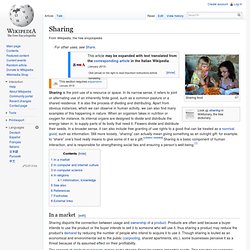
In its narrow sense, it refers to joint or alternating use of an inherently finite good, such as a common pasture or a shared residence. It is also the process of dividing and distributing. Apart from obvious instances, which we can observe in human activity, we can also find many examples of this happening in nature. When an organism takes in nutrition or oxygen for instance, its internal organs are designed to divide and distribute the energy taken in, to supply parts of its body that need it. In a market[edit] The concept of intellectual property makes some sharing illegal for certain intangible goods.
Passion (emotion) The term is also often applied to a lively or eager interest in or admiration for a proposal, cause, or activity or love – to a feeling of unusual excitement, enthusiasm or compelling emotion, a positive affinity or love, towards a subject.
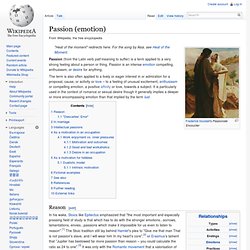
It is particularly used in the context of romance or sexual desire though it generally implies a deeper or more encompassing emotion than that implied by the term lust. The recent concerns of emotional intelligence have been to find a synthesis of the two forces—something that "turns the old understanding of the tension between reason and feeling on its head: it is not that we want to do away with emotion and put reason in its place, as Erasmus had it, but instead find the intelligent balance of the two".[5] Engineering. The American Engineers' Council for Professional Development (ECPD, the predecessor of ABET)[1] has defined "engineering" as: The creative application of scientific principles to design or develop structures, machines, apparatus, or manufacturing processes, or works utilizing them singly or in combination; or to construct or operate the same with full cognizance of their design; or to forecast their behavior under specific operating conditions; all as respects an intended function, economics of operation or safety to life and property.[2][3] One who practices engineering is called an engineer, and those licensed to do so may have more formal designations such as Professional Engineer, Designated Engineering Representative, Chartered Engineer, Incorporated Engineer, Ingenieur or European Engineer.

History[edit] Friendship. Portrait of Two Friends by Italian artist Pontormo c. 1522 Friendship is a relationship of mutual affection between two or more people.[1] Friendship is a stronger form of interpersonal bond than an association. Friendship has been studied in academic fields such as sociology, social psychology, anthropology, and philosophy.
Various academic theories of friendship have been proposed, including social exchange theory, equity theory, relational dialectics, and attachment styles. A World Happiness Database study found that people with close friendships are happier.[2] Poison. Poisons are most often applied in industry, agriculture and other uses for other reasons than their toxicity. Pesticides are one application where they are indeed used for their toxicity. Terminology[edit] Some poisons are also toxins, usually referring to naturally produced substances, such as the bacterial proteins that cause tetanus and botulism. A distinction between the two terms is not always observed, even among scientists. Upper class. The upper class in modern societies is often considered, by middle class social scientists and their adherents, to be the social class composed of the wealthiest members of society, who also wield the greatest political power.
According to this view, the upper class is generally contained within the wealthiest 1-2% of the population, and is distinguished by immense wealth (in the form of estates) which is passed on from generation to generation.[1][unreliable source?] This popular definition is at odds, however, with how the upper class views itself: as members of families that have been long distinguished not merely by wealth or fame which are ostensibly available to all in a democratic society but rather by generations of leadership in public service, education, charity, the military, and the arts.
Historical meaning[edit] In many countries the term "upper class" was intimately associated with hereditary land ownership. British Isles and Colonies[edit] United States[edit] Episcopal polity. Church authority is often represented by ceremonial headdress, such as a mitre. Episcopal polity is a form of church governance that is hierarchical in structure, in which the chief authority over a local Christian church is a bishop. This episcopal structure is found in the ancient Churches: in the various churches of Roman Catholic, Eastern Orthodox and other Eastern Church lineage, and also those of Anglican lineage and many Lutherans. Some churches founded independently of these lineages also employ this form of church governance. Mardi Gras. Traditions[edit] Carnival is an important celebration in Anglican and Catholic European nations.[6] In the United Kingdom and Ireland, the week before Ash Wednesday is called "shrovetide", ending on Shrove Tuesday. It has its popular celebratory aspects as well.
Pancakes are a traditional food. Easter. Lent. Nobility. There is often a variety of ranks within the noble class. Imperialism. Royal family.